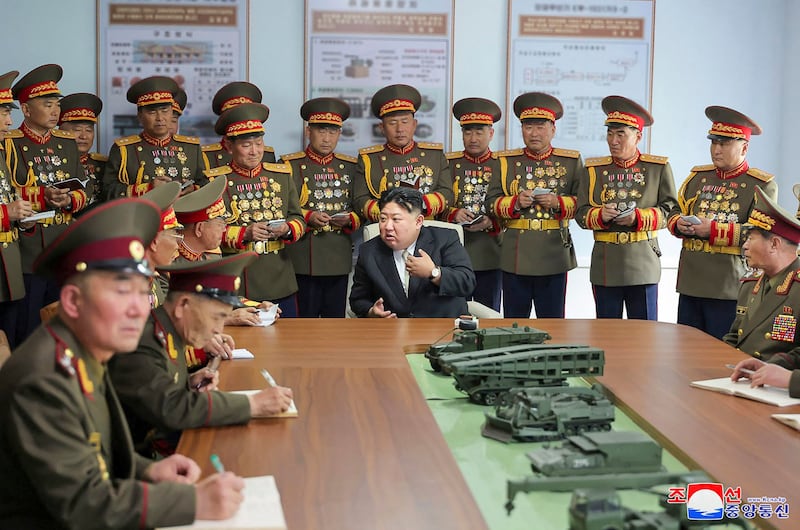New recruits in the North Korean army are pleading with their parents through the military base fence, almost begging them to buy them food, because they aren’t getting enough during the weeklong registration, residents in the country told Radio Free Asia.
“The spring military draft has reached its final stage. Parents of new recruits are complaining about the poor quality of food in the barracks,” a resident of the northeastern province of North Hamgyong told RFA Korean on condition of anonymity for security reasons.
In North Korea, every man must serve seven years in the military, and every woman five.
Every spring and fall, young soldiers-to-be flock to military facilities all over the country.
Serving is a rite of passage, and families come to the barracks to see their children off. At the end of registration, which can last longer than a week after all the medical and fitness tests, the recruits are issued an official Korean People’s Army uniform.
Tearful farewells
Seeing one’s son or daughter in uniform for the first time is often an emotional experience, sources in the country say.
Parents shed tears of joy that their child has reached adulthood, but they are also tears of sadness because they know that life in the military is grueling, and that they won’t see their children for some time.
Whether sad or glad, the parents stay near the barracks to say good-bye to their kids.
“The area near the provincial military mobilization department is crowded with parents of new recruits from all over the region,” the resident said. “I also stayed there for 10 days until I could see my son in uniform.”
She said that the parents wait outside the fence all day, and if their kids have not received their uniform yet, they turn in for the night and return the next morning.
Most recruits will not be assigned to units in their hometowns. In the case of North Hamgyong province, the recruits are usually sent further south to Kangwon or South Hwanghae provinces.
Paltry rations
But parents say their children come to them asking for more food because they are fed such meager rations on base.
“Most children ask their mothers to buy them food through the fence,” the resident said.
“When I asked what they were served at the barracks’ cafeteria, I was told that they get just a single bowl of rice mixed with corn,” she said. “The portions were too small, and the only side dish was salted radish.”
She said the children telling their parents how hungry they were made many mothers cry.
“The parents worry about the hunger their children will experience during their time in the military,” she said. “How nice would it be if the authorities actually fed the children well, after all, the children are preparing to leave their parents and serve.”

In better times the soldiers got a little bit more food.
Prior to the economic crisis caused by the COVID-19 pandemic, soldiers received 800 grams (1.7 pounds) of food per day. Now they get only 600 grams (1.3 pounds).
In comparison, a single meal ready-to-eat, or MRE combat ration, for a U.S. soldier weighs between 510 to 740 grams (1.1 to 1.6 pounds) and likely contains far more calories. And they are fed three times a day.
North Koreans rarely eat meat these days, usually only three to five times per year, during the major holidays.
The resident described the North Korean rations as “pathetic.”
Food vendors
There are those who stand to profit from the poor quality of army food though, a resident of the northern province of Ryanggang told RFA on condition of anonymity to speak freely.
“Every draft season, food vendors gather around the provincial military mobilization department,” he said, adding that the peddlers sell things like rice mixed with artificial meat or tofu, and sweet snacks. The soldiers are so hungry that it’s big business.
For the rich kids though, it’s a different story, the Ryanggang resident said.
On April 10, the country’s leader Kim Jong Un made a visit to Kim Jong Il University of Military Politics – named after his father and predecessor.
“He brought a generous meal for them that included bulgogi (barbecued meat) and apples,” he said.
Parents who gathered outside of the barracks were angry at the news because the kids of the elite receive what enlisted soldiers can only dream about.
“In this one fact, we can see that while Kim Jong Un says he is for the people, in reality, he values the elites,” the resident said.
The future high-ranking officers do not need special treatment, he said.
“I wish Kim Jong Un would care about enlisted soldiers who have to suffer for a long time after they leave their parents at such a young age.”
Translated by Claire S. Lee. Edited by Eugene Whong and Malcolm Foster.
